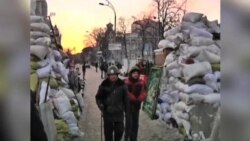LONDON —
Embattled Ukrainian President Viktor Yanukovych, facing massive anti-government protests in Kyiv and regional capitals, has agreed to re-shuffle his government and amend controversial new anti-protest laws.
The concessions were revealed Friday, but hours later TV footage showed huge fireballs lighting up the night sky in central Kyiv. Witnesses said angry protesters entrenched behind huge barricades threw firebombs and rocks at police, who responded with tear gas.
The fighting had stopped at midweek, with a truce called after at least three protesters battling police died - two of them by gunfire.
Ongoing talks between the president and opposition leaders were expected to have stretched through the weekend, but it was not clear early Saturday what impact the new rioting would have on the talks.
One of the leaders - Vitaly Klitschko - described the meeting to the protesters gathered in Independence Square late Thursday night.
"Long hours of conversations, long hours of conversations about nothing.,” Klitschko told the protesters. “Now I understand that to sit down at the same table, with the man who has already decided to lie to you is pointless,” he said.
Arseniy Yatseniuk, another opposition leader, told protesters to defend their territory.
"The decision has been made,” he said. “We are announcing Hrushevskiy Street the territory of the protesters of Independence Square. Not a step back, I ask everyone."
The opposition is demanding that the government resign and snap presidential elections held.
Minister of Justice Olena Lukash criticized their actions.
"Unfortunately for the second time the leaders of the opposition have declined from publicly denouncing the extremists' actions. They also do not condemn the capture of local administration buildings," said Lukash.
Protesters are still occupying government buildings in several western cities in Ukraine after the protests spread beyond Kyiv Wednesday. The governor of Lviv was forced to sign a resignation letter. He says it was done under duress.
Opposition groups allege widespread police brutality - including the shooting dead of at least two protesters, and the torture of protesters in detention a charge security forces deny.
The accusations of police brutality have inflamed the protests against President Yanukovich, says Andy Gundar, director of the Ukrainian Institute in London.
“This is something that the people will not forgive him. And the line has been crossed. So I think it’s going to be a very, very difficult next few days," said Gundar.
The protesters are unlikely to back down, says Orysia Lutsevych of London-based policy institute Chatham House.
“Clearly the protesters went out with the demand of the resignation of the government back two months ago. So I think this demand will have to stay in place and be met if they want civil peace and calm, and people back home from the squares. The problem in Ukraine is also the legislation. That is, they have to change the electoral code before they run any elections," said Lutsevych.
Both the government and the protesters are refusing to give any ground. Fears are growing of more bloodshed in the coming days.
The concessions were revealed Friday, but hours later TV footage showed huge fireballs lighting up the night sky in central Kyiv. Witnesses said angry protesters entrenched behind huge barricades threw firebombs and rocks at police, who responded with tear gas.
The fighting had stopped at midweek, with a truce called after at least three protesters battling police died - two of them by gunfire.
Ongoing talks between the president and opposition leaders were expected to have stretched through the weekend, but it was not clear early Saturday what impact the new rioting would have on the talks.
One of the leaders - Vitaly Klitschko - described the meeting to the protesters gathered in Independence Square late Thursday night.
"Long hours of conversations, long hours of conversations about nothing.,” Klitschko told the protesters. “Now I understand that to sit down at the same table, with the man who has already decided to lie to you is pointless,” he said.
Arseniy Yatseniuk, another opposition leader, told protesters to defend their territory.
"The decision has been made,” he said. “We are announcing Hrushevskiy Street the territory of the protesters of Independence Square. Not a step back, I ask everyone."
The opposition is demanding that the government resign and snap presidential elections held.
Minister of Justice Olena Lukash criticized their actions.
"Unfortunately for the second time the leaders of the opposition have declined from publicly denouncing the extremists' actions. They also do not condemn the capture of local administration buildings," said Lukash.
Protesters are still occupying government buildings in several western cities in Ukraine after the protests spread beyond Kyiv Wednesday. The governor of Lviv was forced to sign a resignation letter. He says it was done under duress.
Opposition groups allege widespread police brutality - including the shooting dead of at least two protesters, and the torture of protesters in detention a charge security forces deny.
The accusations of police brutality have inflamed the protests against President Yanukovich, says Andy Gundar, director of the Ukrainian Institute in London.
“This is something that the people will not forgive him. And the line has been crossed. So I think it’s going to be a very, very difficult next few days," said Gundar.
The protesters are unlikely to back down, says Orysia Lutsevych of London-based policy institute Chatham House.
“Clearly the protesters went out with the demand of the resignation of the government back two months ago. So I think this demand will have to stay in place and be met if they want civil peace and calm, and people back home from the squares. The problem in Ukraine is also the legislation. That is, they have to change the electoral code before they run any elections," said Lutsevych.
Both the government and the protesters are refusing to give any ground. Fears are growing of more bloodshed in the coming days.





